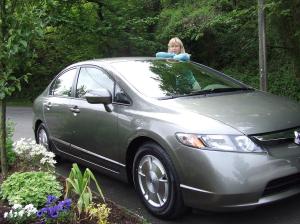 We researched ad nauseum what fuel-efficient, low-emissions car we should buy. We finally chose the Honda Civic hybrid for its great ratings all around, plus its state AND federal tax credits. We waited and waited for it to arrive at the dealership. Last night we finally brought it home.
We researched ad nauseum what fuel-efficient, low-emissions car we should buy. We finally chose the Honda Civic hybrid for its great ratings all around, plus its state AND federal tax credits. We waited and waited for it to arrive at the dealership. Last night we finally brought it home.
Not a car person by nature, I’m learning new things:
- pzev (our Honda is one) means ‘partial zero emissions vehicle’
- the Honda hybrid still gets the $1,050 federal tax credit while the Prius does not
- but both Prius and Honda hybrid get the $1,500 Oregon tax credit
- new hybrids get better mileage as you keep driving them
- (that is no excuse to drive any more than truly necessary)
- ‘magnetic pearl’ is near-black on paper and silver-gray on a real-life car
- car dealerships these days feature nice, high bistro tables and free coffee
- I advise bringing your own coffee instead
Ideally, the single car my husband and I own sits at home daily and acts as a watchdog that keeps burglars away while we take TriMet to work. But now I carpool to Salem most days. Tomorrow will be our new hybrid’s maiden voyage to Oregon’s capital. With four of us in the car, we can get about 160 miles per gallon when calculated on a per person basis. Can you beat that for fuel efficiency?
Wait a minute, yes you can. Walking and bicycling get infinite miles per gallon. And since our friend is coming for dinner tonight I have to fetch a few groceries. Definitely a bike errand. Our sleek hybrid will sit at home in the driveway in all its ‘magnetic pearl’ splendor.


You must be logged in to post a comment.